Don’t Get Gassed: Essential Steps for House Gas Line Repair
By Brian on August 21, 2025
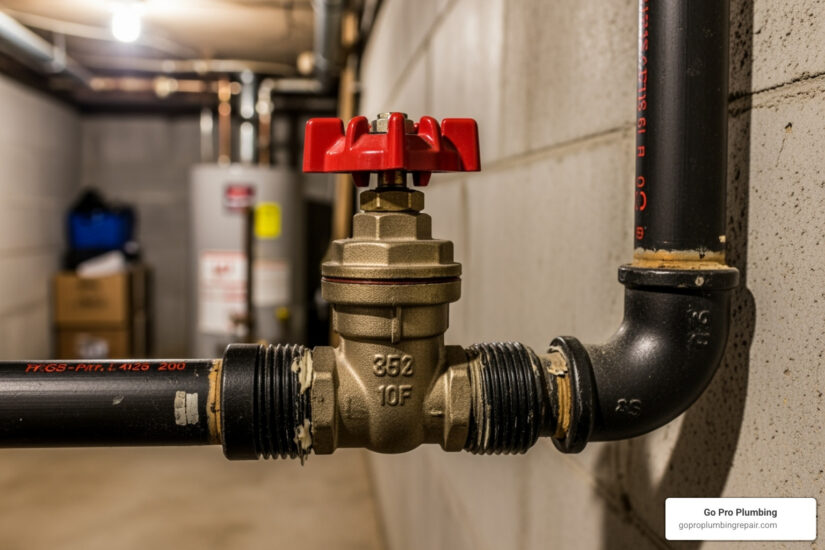
Why House Gas Line Repair Requires Immediate Professional Attention
House gas line repair is a critical safety issue requiring immediate professional help. Gas leaks can cause explosions, fires, and carbon monoxide poisoning, making it an emergency you cannot ignore or fix yourself.
Quick Answer for House Gas Line Repair:
- Evacuate immediately if you smell rotten eggs or hear hissing sounds
- Don’t use electronics – no light switches, phones, or appliances
- Call 911 from outside your home at a safe distance
- Contact a licensed gas plumber for professional repair
- Never attempt DIY repairs – gas line work requires specialized certification
Utility companies add mercaptan to naturally odorless gas, creating a distinct rotten egg smell for leak detection. The average cost for gas line repair ranges from $150 to $300 for minor issues to $300 to $3,000+ for major repairs.
Even a small leak is dangerous, as gas is explosive at concentrations of 5-15% in the air. Homeowners are responsible for maintaining all gas lines from the meter to their appliances; the utility company’s responsibility ends at the meter.
Professional gas line repair is straightforward for certified technicians. The key is to recognize warning signs early and take the correct safety steps before calling for help.
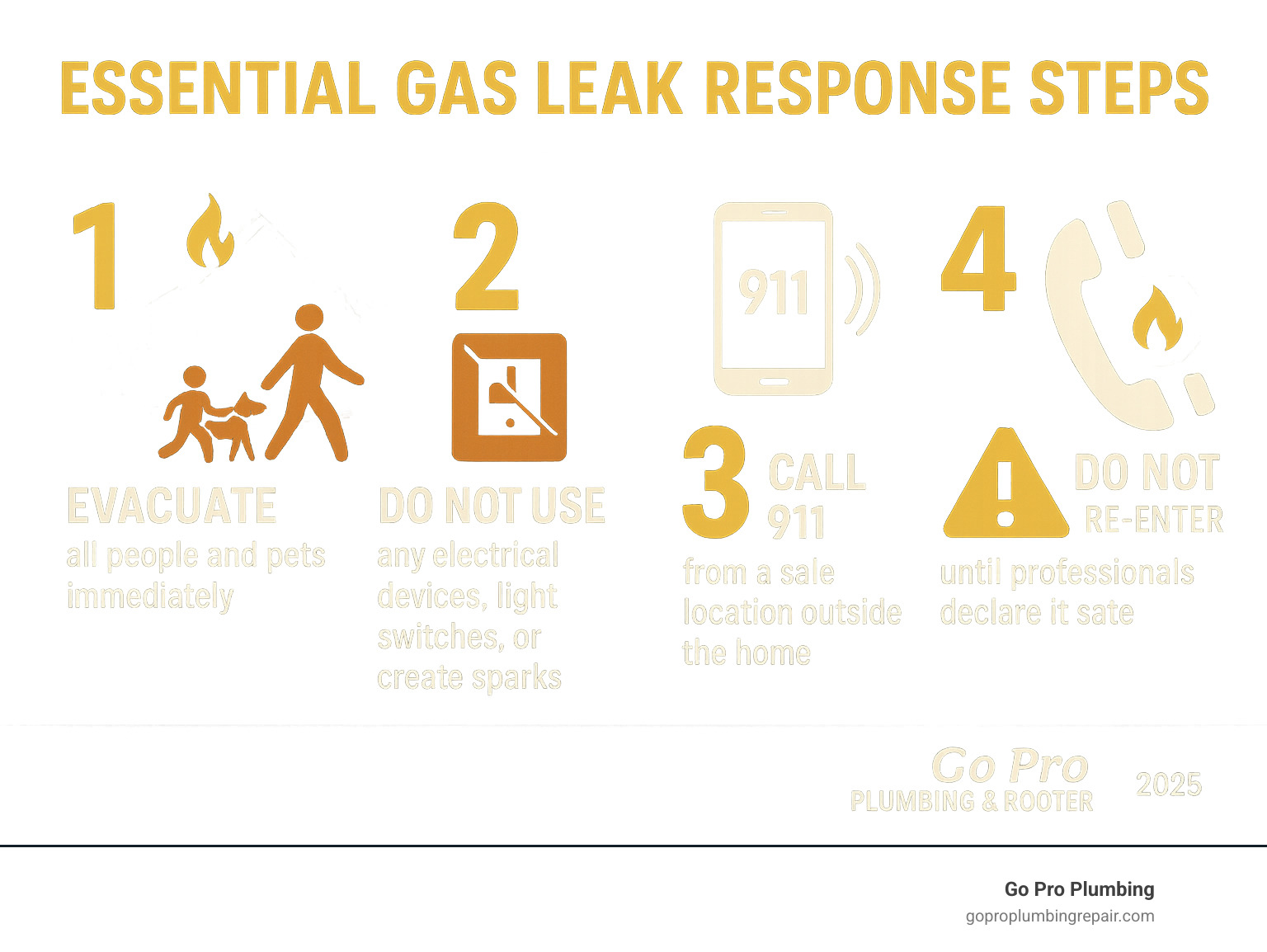
Must-know house gas line repair terms:
Immediate Safety Protocol: What to Do if You Suspect a Gas Leak
In a house gas line repair emergency, there’s no time to hesitate. A quick response can save lives, as a gas leak can become dangerous in seconds.
The rotten egg smell (from an additive called mercaptan) is your signal to act fast, not investigate. Also listen for hissing or whistling sounds near gas lines, which indicate gas escaping under pressure.
Here’s what you need to do the moment you suspect a leak:
Get everyone out immediately. Don’t waste time trying to find the source or grab belongings. Round up family members and pets, and head straight for the exit.
Do not flip switches, use your phone, or operate any electrical appliance. Even a tiny spark from a light switch or cell phone can ignite the gas. This includes electric garage door openers.
Once you are a safe distance from your home (at least 350 feet away), call 911. Then, call the natural gas leak hotline for your utility company, which may shut off the gas remotely or dispatch a crew.
Do not re-enter your home until professionals declare it safe. They have the proper equipment to test air quality and ensure the danger has passed.
Gas leaks don’t wait for convenient times to happen. That’s exactly why we provide Emergency Gas Line Service – because when your family’s safety is at stake, you need help right now, not next Tuesday.
Recognizing the Telltale Signs of a Damaged Gas Line
Not all gas line problems have the obvious rotten egg smell or hissing sounds. Learning to spot more subtle warning signs is crucial for your safety and can prevent costly damage.
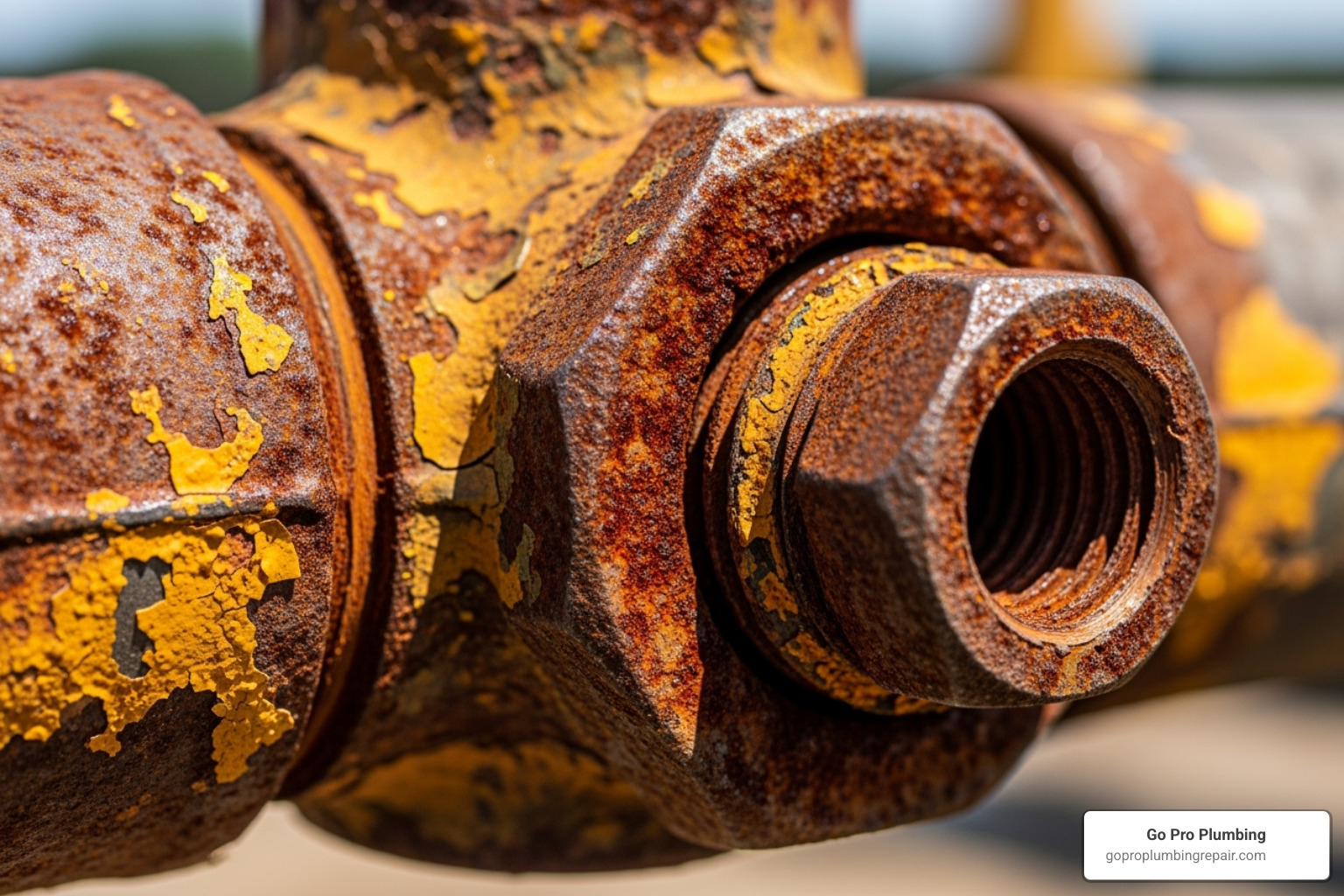
Key Signs You Need House Gas Line Repair
The sulfur or rotten egg smell from mercaptan is the most reliable sign of a leak. If you smell it, evacuate immediately and call for help.
Hissing or whistling sounds near gas lines indicate gas escaping under pressure. Even a faint hiss requires immediate attention.
Visibly damaged or corroded pipes are a clear warning sign. Look for rust, cracks, or dents on exposed gas lines. While pipes can last up to 50 years, corrosion creates safety hazards.
Dying vegetation near gas lines can indicate an underground leak. Natural gas displaces oxygen in the soil, killing plants, grass, and flowers from the roots up.
An unexplained increase in your gas bill can point to a leak. If your usage hasn’t changed, you may be paying for gas escaping into the environment.
Malfunctioning gas appliances can signal supply line issues. Watch for inefficient performance, yellow or orange flames instead of blue, or pilot lights that frequently go out, as these can indicate pressure problems from a leak.
When you spot any of these warning signs, don’t wait. Contact a professional immediately for Gas Pipe Leak Repair.
Health Risks Associated with Gas Leaks
The health effects of a gas leak can mimic common illnesses like the flu, which is why any potential leak must be taken seriously.
Natural gas displaces oxygen, but the greater danger is carbon monoxide (CO). Incomplete combustion due to leaks or poor ventilation produces this highly toxic and potentially fatal gas.
Physical symptoms of gas exposure include:
- Dizziness and lightheadedness
- Nausea and vomiting
- Persistent headaches
- Fatigue and drowsiness
- Difficulty breathing or chest pain
The greatest danger is carbon monoxide poisoning. CO is odorless and colorless, making it undetectable without a proper alarm. Severe headaches, confusion, and loss of consciousness are signs of CO poisoning and can be fatal.
If multiple people in the house feel sick at the same time, or if symptoms improve when you leave and worsen upon return, it strongly suggests an environmental cause like a gas leak.
Your health and your family’s safety are too important to gamble with. When in doubt, trust your instincts and call for professional house gas line repair services.
Understanding the Costs of House Gas Line Repair
Understanding the factors that influence house gas line repair costs can help you avoid surprises on your bill.
Most homeowners pay between $271 and $935 for gas line repairs, with an average of $598. Simple fixes can be $120 to $250, while complex jobs involving excavation can cost $1,500 to $5,000 or more. The final price depends on several key factors.
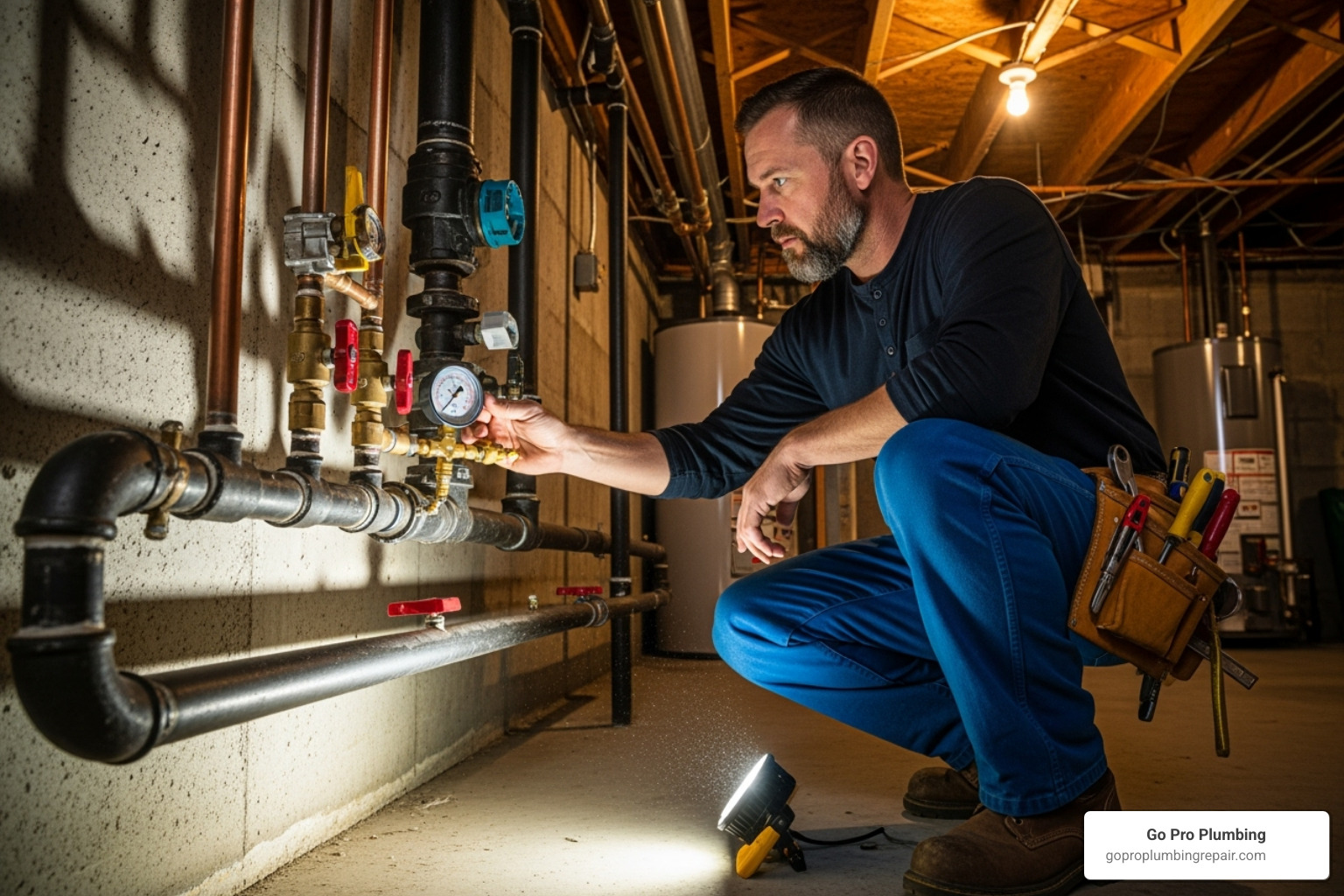
Cost Breakdown by Factor
Labor costs are a primary factor, as gas line work requires licensed, certified professionals. Expect to pay $45 to $150 per hour, plus a minimum service fee of $150 to $200 for this specialized, skilled labor.
The pipe material also impacts cost. PVC and HDPE are budget-friendly ($15-$20/ft), while Copper and brass run $15-$25/ft. Flexible CSST also costs $15-$25/ft. Durable black iron pipe is the premium option at $20-$35/ft. A Black Pipe Gas Line Installation costs more upfront but offers long-term reliability.
Permit and inspection fees are safety requirements that typically range from $50 to $300, depending on your municipality.
Location accessibility is a major cost driver. An exposed leak is the cheapest to fix ($150-$800). A leak inside a wall requires demolition and repair, adding $270-$760. Underground leaks are the most expensive; buried gas line repairs can cost $1,500 to $3,000 for plumbing alone, with total costs reaching $3,000 to $8,000 after excavation and restoration.
Regular Gas Line Maintenance can help you catch small problems before they become expensive excavation projects.
Costs for Additional Services
Several additional services may be necessary during a repair, so it’s helpful to understand these potential costs.
Pressure testing is required after any repair to ensure safety. A standard test costs $75-$150, while more comprehensive tests can be up to $500.
Capping unused lines is a safety measure that typically costs $50 to $200.
Shut-off valve replacement for an outdated or faulty valve typically costs $250 to $750.
Gas meter installation or upgrades, usually handled by the utility company, can cost $300 to $600 and may be needed for new appliances.
A professional gas system inspection costs around $150 and is a smart investment to catch problems early.
Rerouting gas lines for remodels costs $250 to $800, depending on complexity.
For specialized needs like Gas Line Regulator Installation, costs vary. Always request a detailed written estimate that breaks down all anticipated costs.
Repair or Replace? Making the Right Call
Deciding between a simple repair and a full replacement is a key decision when facing a gas line problem. Sometimes a quick fix is enough, but other times it only delays a necessary replacement.
The cost difference is significant. A basic house gas line repair can cost $150 to $800, while a full replacement is a larger investment at $15 to $35 per linear foot, or $3,000 to $7,000 for a whole house. The right choice depends on long-term value and safety.
| Feature | Gas Line Repair | Gas Line Replacement |
|---|---|---|
| Scope | Fixes a specific leak or damaged section. | Replaces a significant portion or entire gas line. |
| Cost | Generally lower for minor issues ($150-$800). | Higher upfront cost ($15-$35/ft, $3,000-$7,000+). |
| Time | Often quicker (1-2 hours for simple leaks). | Can take longer, especially if extensive. |
| Longevity | Extends life of existing line, but new issues may arise elsewhere. | Provides a new, long-lasting solution (50+ years). |
| Permits | May or may not require a permit, depending on local codes and complexity. | Often requires a permit and inspection. |
| Disruption | Minimal, localized. | Can involve wall/floor opening, excavation. |
Sometimes, a repair only fixes one symptom of a larger problem. On an aging system, fixing one leak may not prevent another from appearing elsewhere soon.
Age of pipes is a major factor. Lines over 20-30 years old, especially galvanized steel or iron, are prone to corrosion. At this stage, replacement is often more cost-effective than repeated repairs.
System-wide corrosion is a clear sign that the entire system is failing. If a professional inspection reveals widespread rust or damage, replacement is the recommended solution.
Frequent leaks in different areas indicate a failing system. Continual repairs become costly and risky, making replacement a safer, more economical choice.
Code compliance can necessitate replacement. Older lines may not meet current safety standards, and a major repair is an opportunity to upgrade the entire system for improved safety.
Remodeling or adding new appliances is an ideal time to consider replacement. Upgrading gas lines during a renovation ensures your system is properly sized and compatible with new equipment.
The bottom line? While repairs can solve immediate problems, replacement is often the smarter long-term investment for aging or problematic systems. Our team can assess your specific situation and help you make the right call for your Gas Line Installation needs.
The Professional Repair Process and Why DIY is Not an Option
House gas line repair is absolutely not a DIY project. The risks of explosion, fire, carbon monoxide poisoning, and death are too high. This work must be left to certified professionals to avoid catastrophic accidents.
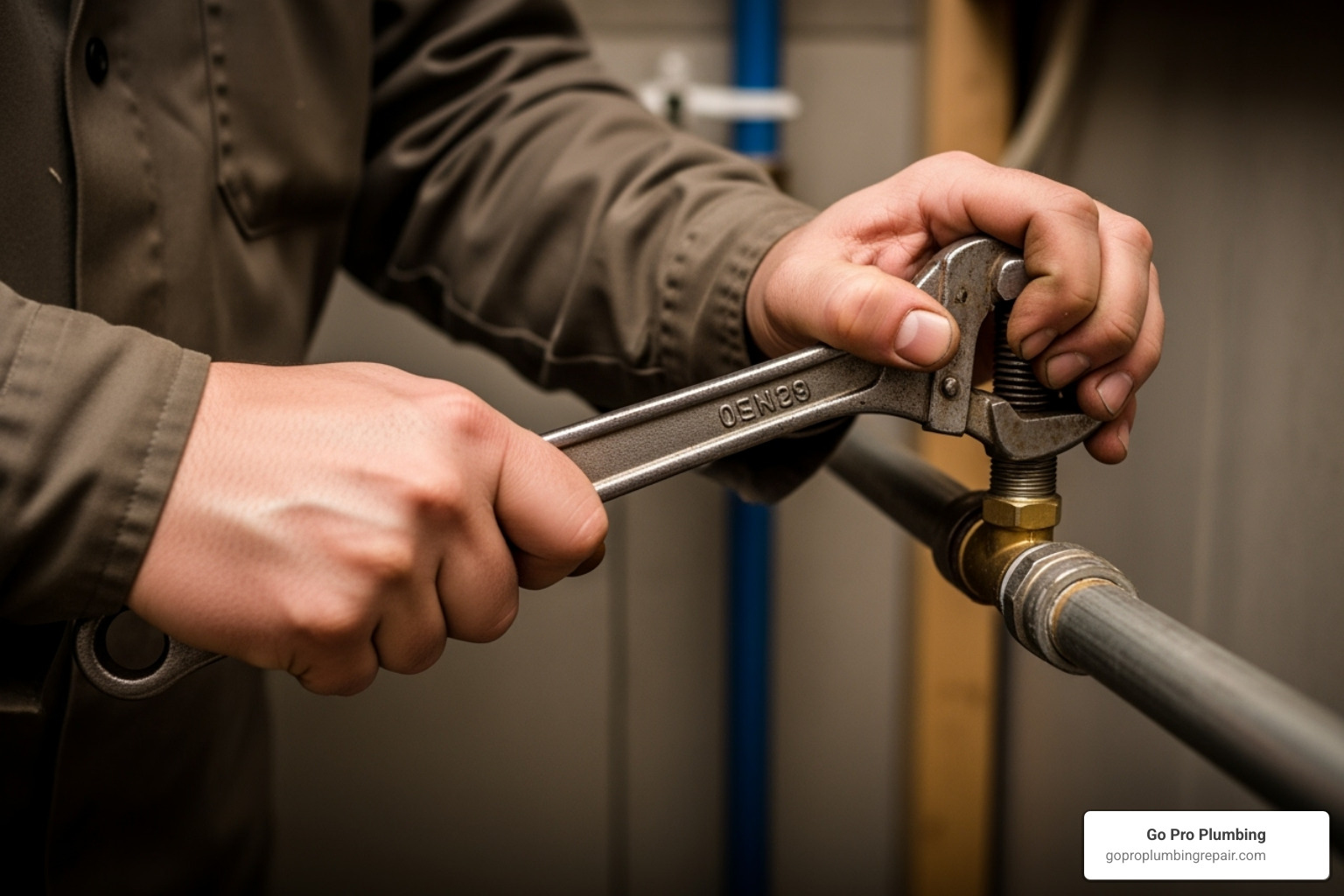
The Professional House Gas Line Repair Process
When you call a professional for house gas line repair, they follow a strict process to ensure safety and a correct fix:
Locating the Line: Professionals use specialized equipment to pinpoint the leak’s location. For underground lines, they call 811 to have all utilities marked before digging to prevent damage to other lines.
Shutting Off the Gas: The gas supply is immediately shut off at the meter to ensure safety during the repair.
Thorough Inspection: The technician inspects the surrounding area to understand the full scope of the problem, not just the obvious leak.
Making the Repair: Depending on the issue, a professional will either repair a leaking fitting using gas-specific sealants (yellow PTFE tape or pipe dope) or replace a damaged section of pipe with new, code-compliant materials.
Rigorous Testing: After the repair, professionals conduct pressure tests with air to check for pressure drops. They also use electronic gas detectors and a soapy water solution to ensure every connection is perfectly sealed.
Restoring Service: Only after confirming everything is safe is the gas service restored. The technician will relight pilot lights and ensure all appliances are working correctly.
This careful process is exactly why we can offer How to Get Gas Line Repair Fast by Using Local Experts – we do it right, and we do it efficiently.
The Dangers of DIY and Questions to Ask a Pro
Attempting DIY gas line repair is extremely dangerous. The risks far outweigh any potential savings.
The dangers of DIY gas line work include:
- Risk of explosion or fire from a small spark.
- Carbon monoxide poisoning from improper sealing.
- Incorrect sealing using the wrong materials, leading to future leaks.
- Code violations resulting in fines and rework orders.
- Voiding your homeowner’s insurance, leaving you financially liable for any damage.
To protect your family and home, always hire a licensed professional. Ask any potential plumber these key questions:
- Do you have proper licensing and insurance for gas line work? A Certified Gas Plumber Sacramento, CA will have the right credentials.
- What is the estimated timeline and cost? Always get a written estimate.
- Will you handle all necessary permits and inspections? A pro should manage this.
- What materials do you recommend? This affects safety and longevity.
- Do you offer a warranty? Reputable plumbers stand by their work.
- What are your safety procedures? They should clearly explain their process for shut-offs, testing, and inspections.
Frequently Asked Questions about Gas Line Repair
When it comes to house gas line repair, homeowners naturally have lots of questions. Here are answers to some of the most common ones.
Are gas lines covered by homeowner’s insurance?
Whether homeowner’s insurance covers gas lines depends on your policy and the cause of the damage. Coverage can be complicated, and it’s important to know what your policy includes.
Standard policies usually cover sudden and accidental damage, such as a fire caused by a gas leak. However, they typically exclude the cost of repairing the line itself, especially if the damage is due to gradual wear and tear, like slow corrosion. A fallen tree crushing a line is sudden damage and likely covered; a pipe corroding over many years is gradual damage and likely not.
You can often purchase a service line endorsement as an add-on to your policy to cover utility line repairs. Review your policy and speak with your agent to understand your coverage. Any damage resulting from DIY repairs will almost certainly be denied by your insurer.
Who is responsible for the gas line to my house?
The gas meter is the dividing line of responsibility. The utility company is responsible for the main line and the service line leading up to and including the meter. The homeowner is responsible for all gas piping from the meter to the house and appliances. This is why you need a trusted professional for Residential Gas Line Repair Northern California, USA.
This division of responsibility explains why you need to maintain your home’s gas lines just like you maintain your plumbing, electrical, or HVAC systems. The gas company isn’t coming to fix a leak in your kitchen or basement – that’s on you to handle professionally and safely.
Can any plumber fix a gas line?
Absolutely not. This is a critical safety distinction. Working with gas requires specialized training, certifications, and licensing that not all plumbers possess. Gas work involves different materials, pressure systems, and safety protocols than water plumbing. A qualified gas plumber is trained in gas systems, local codes, and emergency procedures.
Always verify that a plumber is certified and licensed for gas work before hiring them. The question isn’t just Can a Plumber Fix a Gas Leak?, but if they are qualified to do it safely. Your family’s safety depends on hiring a professional with specific gas system experience.
At Go Pro Plumbing, our technicians are specifically trained and certified for gas line work because we understand that when it comes to gas, there’s no room for error. Your safety is worth the investment in proper, professional service.
Conclusion
Gas line issues require immediate attention. This guide has covered the essentials of house gas line repair, from recognizing warning signs to knowing when to call a professional.
The most important takeaway is that safety comes first. The rotten egg smell, hissing sounds, or dying plants near gas lines are urgent signals to evacuate and call for help.
We must emphasize that house gas line repair is never a DIY project. The risks are too high, and the work requires specialized training and licensing that only certified professionals have.
While minor repairs cost $150 to $800, the price of professional service is an investment in your family’s safety that pales in comparison to the potential cost of a fire or explosion.
Pay attention to the early warning signs we’ve discussed, like high gas bills or faulty appliances. Prompt action and regular maintenance can prevent major problems down the road.
At Go Pro Plumbing, we understand that gas line emergencies don’t wait for convenient times. That’s why we’re committed to outstanding customer service and same-day service throughout Northern California. Our certified professionals have the expertise and equipment to handle your gas line needs safely and efficiently.
Don’t take chances with your family’s safety. When you need reliable, professional gas line service, we’re here to help.
Schedule your gas line repair service today and let our certified experts give you the peace of mind you deserve.
